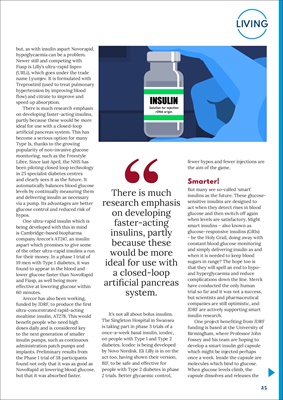
25
LIVING
in 25 specialist diabetes centres
and clearly sees it as the future. It
automatically balances blood glucose
levels by continually measuring them
and delivering insulin as necessary
via a pump. Its advantages are better
glucose control and reduced risk of
hypos.
One ultra-rapid insulin which is
being developed with this in mind
is Cambridge-based biopharma
company Arecor's AT247, an insulin
aspart which promises to give some
of the other ultra-rapid insulins a run
for their money. In a phase 1 trial of
19 men with Type 1 diabetes, it was
found to appear in the blood and
lower glucose faster than NovoRapid
and Fiasp, as well being more
effective at lowering glucose within
60 minutes.
Arecor has also been working,
funded by JDRF, to produce the first
ultra-concentrated rapid-acting
mealtime insulin, AT278. This would
benefit people who need high
doses daily and is considered key
to the next generation of smaller
insulin pumps, such as continuous
administration patch pumps and
implants. Preliminary results from
the Phase 1 trial of 38 participants
found not only that it was as good as
NovoRapid at lowering blood glucose,
but that it was absorbed faster.
It's not all about bolus insulins.
The Singleton Hospital in Swansea
is taking part in phase 3 trials of a
once-a-week basal insulin, icodec,
on people with Type 1 and Type 2
diabetes. Icodec is being developed
by Novo Nordisk. Eli Lilly is in on the
act too, having shown their version,
BIF, to be safe and effective for
people with Type 2 diabetes in phase
2 trials. Better glycaemic control,
fewer hypos and fewer injections are
the aim of the game.
Smarter!
But many see so-called 'smart'
insulins as the future. These glucosesensitive
insulins are designed to
act when they detect rises in blood
glucose and then switch off again
when levels are satisfactory. Might
smart insulins - also known as
glucose-responsive insulins (GRIs) -
be the Holy Grail, doing away with
constant blood glucose monitoring
and simply delivering insulin as and
when it is needed to keep blood
sugars in range? The hope too is
they will spell an end to hypo-
and hyperglycaemia, and reduce
complications down the line. Merck
have conducted the only human
trial so far and it was not a success,
but scientists and pharmaceutical
companies are still optimistic, and
JDRF are actively supporting smart
insulin research.
One project benefiting from JDRF
funding is based at the University of
Birmingham, where Professor John
Fossey and his team are hoping to
develop a smart insulin gel capsule
which might be injected perhaps
once a week. Inside the capsule are
molecules which bind to glucose.
When glucose levels climb, the
capsule dissolves and releases the
insulin. While animal trials are due
shortly, humans won't get to try it
out any time soon.
In 2015 scientists at the University
of Utah succeeded in stabilising the
blood sugar levels of diabetic mice
by giving them a once-daily injection
of a new smart insulin, Ins-PBA-F.
Ins-PBA-F has been modified to bind
to albumin, a blood protein, when it
is injected. This stores it until blood
glucose levels rise to a certain point,
and then the insulin is released.
Human trials are planned soon.
Animal studies of a smart insulin
patch have proved promising
too. Developed by researchers at
the University of North Carolina,
University of California Los Angeles
and Massachusetts Institute of
Technology, the adhesive patch,
which is less than the diameter of a
£1 coin, monitors blood sugar. It has
doses of insulin pre-loaded in very
tiny microneedles made of a glucosesensing polymer.
Insulin is delivered
rapidly when blood sugar levels reach
a certain threshold and delivery
slows down when levels return
to normal.
The big three
The insulin market is dominated
by the "big three" - Eli Lilly, Novo
Nordisk and Sanofi - who between
have 96% of the market GLOBALLY?.
They are all serious about making
intelligent insulin a reality. Eli
Lilly have bought California-based
biotech company Protomer in a
deal which could be worth $1bn.
"Protomer's glucose-sensing insulin
There is much
research emphasis
on developing
faster-acting
insulins, partly
because these
would be more
ideal for use with
a closed-loop
artificial pancreas
system.